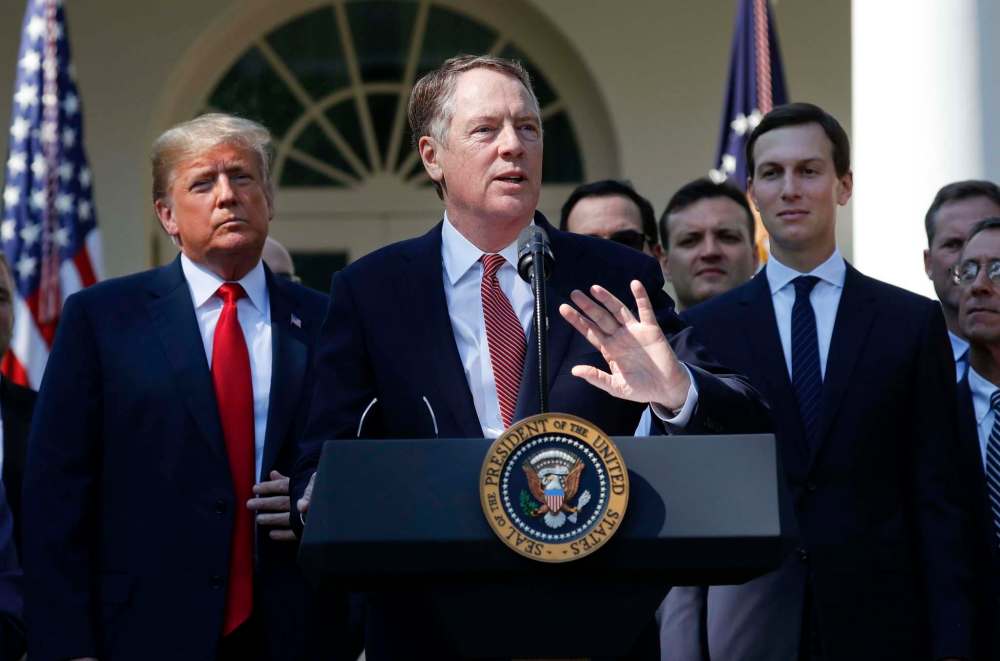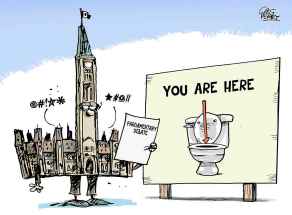New trade deal a decent compromise
Read this article for free:
or
Already have an account? Log in here »
To continue reading, please subscribe:
Monthly Digital Subscription
$0 for the first 4 weeks*
- Enjoy unlimited reading on winnipegfreepress.com
- Read the E-Edition, our digital replica newspaper
- Access News Break, our award-winning app
- Play interactive puzzles
*No charge for 4 weeks then price increases to the regular rate of $19.00 plus GST every four weeks. Offer available to new and qualified returning subscribers only. Cancel any time.
Monthly Digital Subscription
$4.75/week*
- Enjoy unlimited reading on winnipegfreepress.com
- Read the E-Edition, our digital replica newspaper
- Access News Break, our award-winning app
- Play interactive puzzles
*Billed as $19 plus GST every four weeks. Cancel any time.
To continue reading, please subscribe:
Add Free Press access to your Brandon Sun subscription for only an additional
$1 for the first 4 weeks*
*Your next subscription payment will increase by $1.00 and you will be charged $16.99 plus GST for four weeks. After four weeks, your payment will increase to $23.99 plus GST every four weeks.
Read unlimited articles for free today:
or
Already have an account? Log in here »
Hey there, time traveller!
This article was published 01/10/2018 (2631 days ago), so information in it may no longer be current.
On Sunday night, Canada reached a trade treaty with the United States and Mexico that is only a little worse than what we’ve had for the past 24 years. This comes as a pleasant surprise, considering that U.S. President Donald Trump came into office a year and a half ago intending to raise huge new barriers against Canadian trade. The new treaty falls well short of free trade within North America, but it will probably allow continued economic expansion in all three countries.
The main political difference between the old North American Free Trade Agreement (NAFTA) and the new United States-Mexico-Canada Agreement (USMCA) is that Mr. Trump didn’t like that one and he does like this one. The substance is much the same in many respects, but Mr. Trump has given it a new name that starts with the words “United States,” in keeping with his doctrine of America First. He thinks it’s his child, and that is all the difference in the world as long as he is president.
The main practical difference for Canada is that Canadian companies now know what access they will have to the U.S. market. Companies that have been deferring expansion can now take their investment plans off the shelf. This should produce at least a brief spurt in economic growth.

There will be losers. Dairy producers will face stiffer competition. Retailers will face stiffer competition from U.S.-based online retailers. B.C. wineries will face tougher competition in grocery stores. These firms may succeed in meeting the new competition or they may suffer declining sales. Some may go out of business and blame USMCA for their difficulty. Canada will need to provide transitional assistance to ease these firms into the new trade regime.
When this negotiation started 14 months ago, U.S. Trade Representative Robert Lighthizer and his team wanted automatic termination of the treaty every five years unless all three countries chose renewal. They wanted to eliminate Canada’s system of supply management in dairy, eggs and poultry. They wanted to eliminate binational dispute-settlement panels. The Canadian side, to its credit, did not submit to these unreasonable demands. The U.S. side, to its credit, recognized the weakness of its position and dropped these demands.
Mr. Trump thinks the agreement was reached because he imposed punitive tariffs on Canadian steel and aluminum. It is probably more true to say that agreement was reached because both sides dropped the demands that were arousing no interest at the bargaining table.
Oddly, the tariffs he imposed continue even though the agreement has been reached. Canada’s retaliatory tariffs also continue in force. We have a trade treaty, but we also have a continuing trade war. The U.S. is agreeing to a set of rules, but it also insists on its right to impose import tariffs arbitrarily in the name of national security, even where the products involved have no connection to national security. With one hand, it is signing on to a set of rules. With the other, it is claiming a right to coerce Canada through punitive and arbitrary tariffs any time it wants to. What kind of a trade partner is that?
The details will emerge in coming days as industries read the small print. When Canadians see the U.S. midterm election results five weeks hence, they may wish we had waited a little longer. But we have a deal and, on balance, it’s not so bad.










